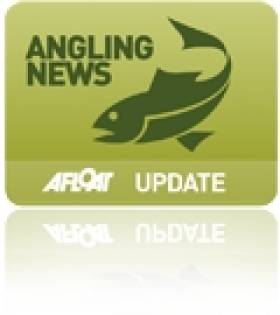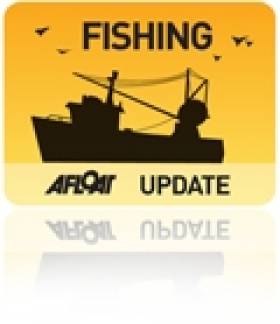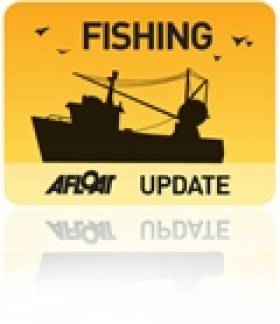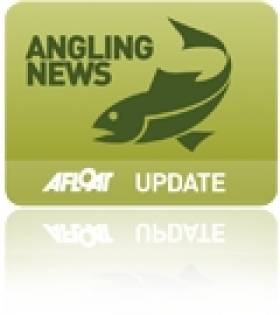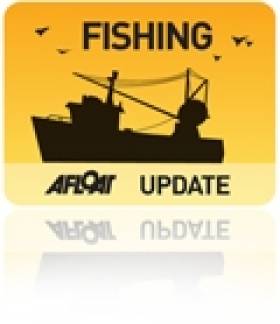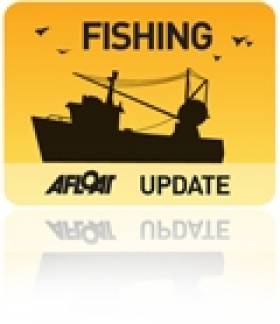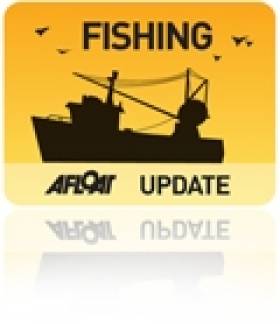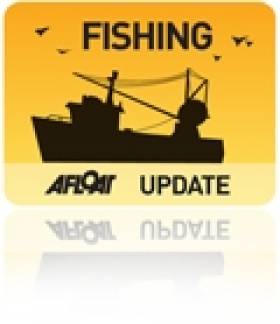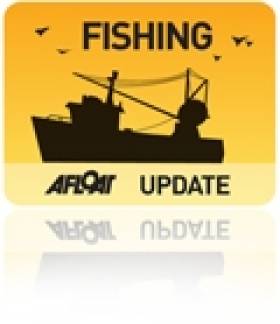Displaying items by tag: Fishing
Burrishoole Fishery in Furnace, County Mayo Opens 19th June
#fisheries – The Burrishoole Fishery in Furnace, Co Mayo opens Wednesday 19th June to 29th September. The Fishery will be open weekly on Wednesday through to Sunday 9:00am to 6:00pm.
The Burrishoole Fishery, which is owned by the Marine Institute, is one of Ireland's premier Lough fisheries for salmon and offers a unique fishing experience.
Mr Bill Bullick from Belfast has been returning to Newport to fish in the area for nearly 40 years, since he was a child and has developed a passion for the Burrishoole fishery. "Like all wild fishing, it is rarely easy and sometimes, can be impossible. But, when the day is right, it is magic. Lough Furnace, the Neck fishery and Lough Feeagh all offer perfect fishing conditions. The quality would attract anglers from anywhere in the world. And if you want to catch salmon from a boat, there is no better place, nor are there better people to do it with," he said.
"Real friendships with the fisheries management and the ghillies have also been established over the years. These men are not mere boat-men, but professionals, who have learned their trades over a life-time," explained Mr Bill Bullick.
The Burrishoole Fishery which is primarily based on the two lower Loughs of the Burrishoole System includes Lough Furnace and Lough Feagh. There are two channels through which the outflow from Lough Feeagh discharges into Lough Furnace, one is a natural rock gorge about 15m wide, which is known locally as the "Salmon Leap". The other is an artificial channel about 8m wide, which is known locally as the "Mill Race".
The fish trapping facilities in Burrishoole are unique, having been in operation since 1958, with full trapping since 1970. "The Burrishoole Fishery is unusual in that it forms part of a catchment dedicated to scientific research. The catch and information from the fishery form a vital component of the scientific returns and for this reason the fishery is highly regulated," explained Pat Hughes who is the Burrishoole Fishery manager.
These regulations have enabled a full census to be made of all migratory fish movements upstream and downstream since 1970. As a result the Burrishoole System is utilised as one of the key index systems for salmon, sea trout and eel. Data about the fish collected from the Burrishoole system is used extensively by ICES (International Council for the Exploration of the Seas) to gauge the overall status of the Irish stocks on an annual basis.
#Fishing - The growing black market for coarse fish in eastern Europe is being blamed for an increase in illegal fishing on Ireland's inland waterways.
That's the situation according to the Sunday Independent, which also highlights the "major problem" of salmon poaching by "Irish criminals".
Last month Afloat.ie reported on the prosecution of two Lithuanian brothers who were fined for illegal coarse angling on Lough Derg.
And the Independent says a number of similar cases are due to be heard before Irish courts over the coming months.
Meanwhile, poaching of salmon is hitting the headlines across the country - from the south, where two men were recently prosecuted for illegal fishing of spawning salmon in Co Limerick, to the north, where intimidation of fisheries staff is reportedly a problem.
In better fisheries news, The Guardian says cod stocks in the North Sea could be in for a revival, after a survey by the Marine Stewardship Council and others suggested that effective management could soon see the species certified as 'sustainable'.
Drogheda Hosts North Atlantic Salmon Conference
#Fishing - Drogheda is hosting the 30th annual meeting of the North Atlantic Salmon Conservation Organisation (NASCO) this week till Friday 7 June.
The prestigious fisheries conference will take place in the Westcourt Hotel and will be attended by delegates from Canada, Denmark (in respect of the Faroe Islands and Greenland), the European Union (representing its 27 member states), Norway, Russia and the USA.
Welcoming the conference to Drogheda on Tuesday 4 June, Minister Fergus O’Dowd said it "will continue the key work of NASCO, using the best scientific information, and international co-operation to conserve and manage Atlantic salmon populations.
"I wish the many delegates a friendly and intellectually stimulating stay in Drogheda where the meeting programme will no doubt provide insights and an outstanding platform for dynamic networking to ensure the continued conservation of our precious salmon stocks."
Based in Edinburgh, NASCO is an international organisation established by an intergovernmental convention in 1984. Its main function is to conserve, restore, enhance and rationally manage Atlantic salmon through international cooperation taking account of the best available scientific information.
NASCO is the only intergovernmental organisation with this mandate, which it implements through international consultation, negotiation and co-operation.
Ireland is at the forefront of salmon conservation internationally, according to Inland Fisheries Ireland, which adds that Irish participants at the conference include a Government delegation of managers and scientists and representatives of a number of Irish-based NGOs, including Salmon Watch Ireland.
The cross-border Loughs Agency, which has responsibility for salmon conservation and protection Foyle and Carlingford Loughs, will also be represented as part of the Irish delegation.
Two Prosecuted For Illegal Fishing of Spawning Salmon
#Angling - Two men have been prosecuted in Co Tipperary for illegal fishing of spawning salmon.
Michael Harding of Bansha and Neill Collins of Cullen were prosecuted by Inland Fisheries Ireland (IFI) following investigations on the River Aherlow at Angelsboro, Co Limerick on 2 January this year.
IFI fishery officer Noel Power told Judge William Early at a sitting of Fermoy District Court on 3 May that both men has been observed fishing by night with a lamp and a spear.
Having heard the evidence, Judge Early convicted both men and levied fines on each: €350 for Collins and €300 for Harding, who informed the court he was unemployed. Both men were also ordered to pay costs amounting to €418.90.
"Wild Atlantic Salmon are part of our heritage," said Minister Fergus O’Dowd following the prosecution, "and the killing of spawning fish is an environmental outrage.
"I once again commend the work of IFI staff, working in remote areas, in the worst of weather, late at night protecting our wild salmon."
IFI reminds all anglers that interference with fish over their spawning beds is a serious offence, and that its staff are involved trying to stamp out this activity.
Much illegal fishing takes place at night, and IFI staff patrol the rivers during winter nights to ensure the protection of fish stocks.
"This illegal fishing is both barbaric and a threat to spawning salmon," says the fisheries agency. "Spears and modified forks are sometimes used in tandem with lights in the illegal killing of spawning salmon."
Fish Discards Should End 'Within Six Years' Says Coveney
#CFP - The deal reached between EU fisheries ministers this morning on reform of the Common Fisheries Policy (CFP) should bring an end to the practice of fish discards within the next six years, according to Ireland's Marine Minister.
As reported earlier today on Afloat.ie, Minister Simon Coveney emerged from 36 hours of talks in Brussels confident that a far-reaching reform on fisheries policy had been reached.
RTÉ News reports that the compromise deal will see a 93% ban on discards take immediate effect, phasing towards a full ban by 2019, with special allowances made in certain cases where sustainability of fish stocks allows.
Minister Coveney, as president of the EU Council of Fisheries Ministers during Ireland's EU presidency, will submit the agreed reforms to the European Parliament - which has previously been steadfast in its demands for a complete ban on fish discards to halt the depletion of fish stocks in European waters.
As previously reported on Afloat.ie, this week's discussions on fisheries reform in Brussels have been described as a "once-in-a-decade opportunity" to end the wasteful practice of fish discards, which has seen as much as 50% of the catch in the North Sea is thrown back overboard dead.
The Minister for Marine, Simon Coveney TD, at 6.15 a.m. this morning, after some 36 hours of negotiations, secured a new mandate from EU Fisheries Ministers to enter final negotiations with the European Parliament on a reformed Common Fisheries Policy.
The new position drafted by the Council of Ministers is based on a revised 200 page compromise legal text which Minister Coveney presented to Fisheries Ministers on early Wednesday morning.
Minister Coveney welcomed the support he received at the Fisheries Council saying:
"This agreement follows very difficult and complex negotiations, it amounts to a significant compromise on behalf of my fellow Fisheries Ministers to allow further negotiations with the European Parliament take place to finalise the Reform of the Common Fisheries Policy in the coming weeks."
The Minister went on to say:
"This decision by the Council is a major conciliatory step in the direction of the European Parliament and hopefully paves the way for successful conclusion of the inter-institutional negotiations on the reform. It is evidence of the importance placed by Fisheries Ministers on making this radical package of measures"
The Irish Presidency has prioritised securing CFP reform before the end of its term and three-way talks between the Council, European Parliament and Commission will now continue with the aim of achieving that goal on the basis of this new position drafted by the Council of Ministers.
Minister Coveney continued:
"The Council has recognised the practical challenges of fishermen and the potential socio-economic impacts in coastal communities during the negotiations over the past number of months. I believe that the historical package agreed this morning will prepare the way for a European wide discards ban, facilitate more sustainable fishing levels in addition to appropriate management of fleet capacity and a workable regionalisation policy. It will provide the framework for the long term sustainability of the fish stocks around our shores and the continued economic viability of our fishing fleet and the processors and communities that depend on them".
The package agreed this morning will allow us to rebuild the fish stocks in European waters and will allow for significant quota increases for our fishermen as we phase out the wasteful practice of discarding fish and see the benefits of this change in rebuilding our fish stocks and ensuring a better, and more secure future, for our fishermen and coastal communities.
The Minister will this morning present the new compromise to the leaders of the Fisheries Committee of the European Parliament and explain the thinking behind it.
The Minister concluded saying:
"We are under no illusions as to the challenges facing us with the European Parliament, however the strong compromise mandate given to me today places added responsibility on our co-legislators in the European Parliament to show reciprocal flexibility to facilitate the successful conclusion on the Common Fisheries Policy, which is the objective of both institutions."
#CFP - 'Fight Fight' campaigner Hugh Fearnley-Whittingstall writes on the Guardian's Comment Is Free blog that this week's upcoming discussions among the EU's fisheries ministers is a "once-in-a-decade opportunity" to end the practice of fish discards.
The TV chef, who has long campaigned against the practice of discarding fish in Europe's seas under the quota system implemented by the Common Fisheries Policy (CFP), hopes that this week's discussions among EU ministers over the final text to submit to the European Parliament includes "a proper discard ban - one that will finally eliminate the disgraceful waste of fish that occurs under the current system".
Though all parties involved have agreed in principle to ban discards, Fearnley-Whittingstall believes "we're in the endgame: a tussle between the parliament and the ministers over the final shape of the new CFP" - with "powerful fishing countries such as France and Spain happier to see the current broken system continue, rather than deal with the awkward aspects of transforming their fisheries into a sustainable, profitable and growing sector".
As previously reported on Afloat.ie, Ireland's Marine Minister Simon Coveney - president of the EU Council of Fisheries Ministers - is pushing for ministers to focus on the most critical elements such as fish discards in their discussions on CFP reform in Brussels from tomorrow 13 May.
#Fishing - Marine Minister Simon Coveney will present a revised comprehensive compromise Irish EU presidency text to the EU Council of Fisheries Ministers on Monday 13 May seeking a new mandate to re-enter final negotiations with the European Parliament on a reformed Common Fisheries Policy (CFP).
Minister Coveney said that these decisive negotiations for agreeing a comprehensive reform of the CFP in Brussels on 13-14 May are likely to be very difficult given the significance for the next decade of what may be decided at the meeting.
“An enormous amount of work has gone into progressing the reform with council, commission and parliament during the Irish presidency," he said. "We now have an Irish presidency substantially revised set of compromise proposals which I believe give us a sound basis for positive engagement at council.
"Agreement at council on this presidency compromise package would support an ambitious reformed CFP which would secure a better future for our fish stocks and for the fishermen and coastal communities who depend on them."
The minister emphasised that there is a "very short window of opportunity for council and parliament to agree and deliver an effective reform of our fisheries policy and the Irish presidency is doing all it can to bring the institutions together to take this historic opportunity.
"I believe that if all parties focus on the critical elements of a reformed CFP, we can by working together reach realistic and substantial agreement through the co-decision process during the Irish presidency.”
Formal negotiations with the European Parliament have resulted in the Irish presidency drawing up a revised compromise 200-page legal text, which Minister Coveney, as president of the council, will use as the basis of negotiations with EU fisheries ministers.
The objective is to get political agreement on a final compromise package to enable conclusion of negotiations with the parliament and the commission on CFP reform during the Irish presidency, which concludes at the end of June.
Minister Coveney will also update EU ministerial colleagues on progress made to date by the Irish presidency during the ‘trilogue’ process where EU presidency (council), commission and parliament have been engaged in complex discussions on refining proposals for CFP reform.
€1billion of Fish Annually Taken from Irish National Waters – Fishing for Justice Website
A website launched by West Cork fishermen says now is the time to reform the Common Fisheries Policy because 'Ireland continues to gift the EU with €1billion of fish annually from Irish national waters'.
The website is supported with significant statistics showing Ireland's low rights compared with European neighbours.
Ireland, a peripheral island with some of the richest fishing waters in the E.U. and a three thousand mile coastline, get a mere 4% of the valuable demersal (bottom feeding fish) quotas. This is meant to serve over 2,000 vessels while, as the website says 'our so called partners take over one billion Euro per annum from what we call our water'.
More on http://fishingforjustice.eu
Connemara Oyster Grounds To Lose Disease-Free Status
#Fishing - The Marine Institute is encouraging the agreement of a new code of practice for oyster fishing at Ballinakill Bay in Co Galway, which is set to lose its disease-free status.
Galway Bay FM reports that a single oyster out of 900 tested at the bay, near Letterfrack on the north-west coast of Connemara, tested positive for the Ostreid herpes virus two years ago as part of an EU-supported programme.
Though accounting for just 0.11% of the entire sample, the positive test is enough to strip the area of its clean status.
Senator Trevor O'Clochartaigh raised the issue in the Seanad last week, which prompted the Department of the Marine to confirm that the Marine Institute recommends a code of practice that would see the area's status eventually reinstated.



























